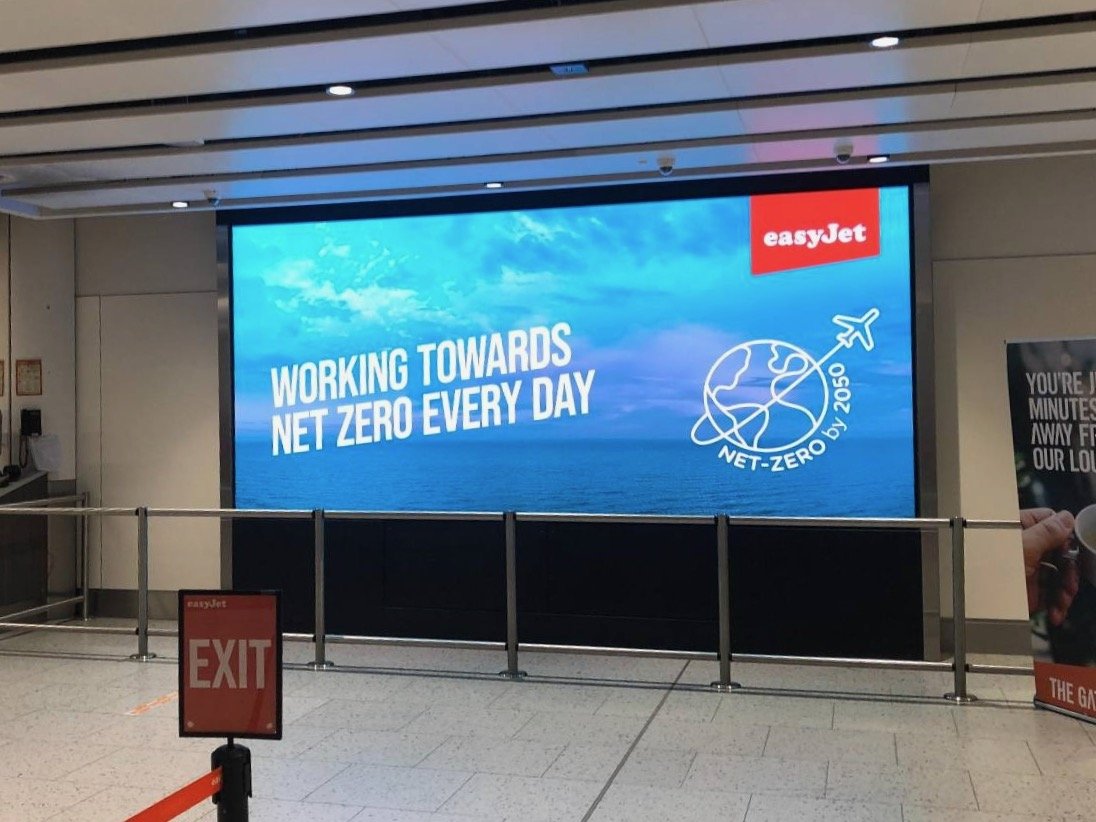Badvert of the Month: Easyjet climate ad takes passengers for a ride
Budget airline Easyjet claims to be ‘Working towards net zero everyday’, but is it? Our latest badvert of the month investigates.
Airports are filing planning applications for expansion and airlines joyfully predicting massive increases in passenger numbers. At the same time the global aviation industry waves a climate policy that ignores half of their impact, and the UK government hides behind its wildly inadequate “Jet Zero” policy. But there’s a potential hitch in the expansionist trajectory planned by profiteering corporations and climate-blind politicians.
Passengers are becoming increasingly aware of how damaging it is to fly. Just one long haul flight can emit more pollution than many individuals do in their entire year - a fact that’s becoming harder and harder to ignore.
Could this growing unease damage aviation's chances of untrammelled growth (and climate collapse)? With the popularisation of movements like Flight Free UK, Stay Grounded and Sweden’s flygskam, literally “flight shame”, and ever-growing awareness of the disproportionate pollution caused by flying, social pressures could damage airlines’ passenger numbers and ultimately, profits.
Airlines, like oil and gas companies, use advertising to drown out the noise. Airlines like Easyjet often ignore the climate impacts of their activities in their family fun ads, and have even been known to actively hijack extreme weather events to sell plane tickets. Ignoring climate impacts in wide-reaching marketing campaigns normalises taking a flight across demographics, drowning out climate concerns.
Activist groups like Brandalism have taken aim at the aviation sector’s glib attitude to promoting cheap flights to holiday destinations in climate-vulnerable areas, in hard hitting ad hack protests.
Above: A spoof artwork by Matt Manson takes aim at easyJet and its ad agency VCCP, in a project by activist network Brandalism.
However, recent Easyjet marketing on ad screens in Gatwick Airport takes a different approach, boldly proclaiming the airline’s net zero commitments. The ad claims that Easyjet is “working towards net zero every day”. Really?!
In 2023, Easyjet transported almost 83 million passengers, approaching its pre-pandemic levels of 96 million in 2019. That’s 227,397 passengers every day in 2023.
The airline has no plans to reduce passenger numbers or fleet size, no plans for a just transition for workers in the sector, and its net zero “roadmap” fails to meet basic standards for reducing emissions. The airline’s annual global emissions in 2022 were 8,081,946 tonnes of CO2e (8.1 MtCO2e), equal to that of Mozambique in the same year. It is Europe’s second most polluting airline.
Apart from the omission of information about Easyjet’s activities from the claim “working towards net zero every day”, the phrase ‘net zero’ has been proven to cause confusion through implying an absolute reduction in emissions, when this is not the meaning of ‘net’ zero. In the second ad frame, the text “To help protect our planet we’ve published our roadmap to becoming a net zero carbon airline by 2050” throws up further issues. To start with, it’s not possible to know how much help publishing something will be at this stage of climate breakdown, but probably not much.
That aside, a closer look at the “roadmap” forming Easyjet’s strategy for “net zero” immediately shows that it is based on carbon emissions intensity (i.e. how much carbon is emitted per passenger kilometre), not an absolute reduction in emissions. This would allow for an increase in emissions if passenger numbers increase, discrediting the strategy by the standards of the Sustainability Based Targets initiative, which Easyjet cites in its sustainability webpage.
In a complaint to the ASA, our partner campaign Adfree Cities claims that this advert “risks encouraging customers to fly with Easyjet under a false impression of environmental sustainability. More broadly, the ad gives a false impression that travelling by air is compatible with efforts to “protect our planet”, which is false and socially irresponsible.”
As climate concerns deepen, airlines are simultaneously protecting their passenger numbers and justifying expansion plans through greenwash advertising that proclaims their activities as “net zero” and “sustainable”. If you find this advert harmful, misleading or offensive, you can report it to the ASA.
Company background:
Easyjet’s annual global emissions in 2022 were 8,081,946 tonnes of CO2e (8.1 MtCO2e), equal to that of Mozambique in the same year. It is Europe’s second most polluting airline, based on verified emissions covered by the European Union Emissions Trading Scheme (EU ETS): between 2012 to 2022, Easyjet emitted 49.6 million metric tons of CO2e, (49.6 MtCO2e) for flights within the European Union Economic Area.


